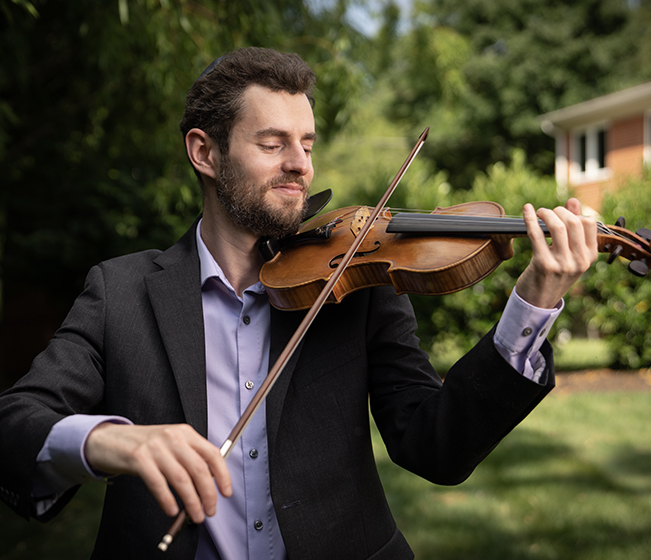
When did it start? It started before I knew it.
Music was in my life before I could even walk. It was introduced to me by my older brother, whose violin-playing I listened to while in the crib. The music of Rode, Weniawski and Vieuxtemps was my childhood. At the age of five I met my first ever violin teacher – Mikhail Abramovich Piontak.
Why did I not quit? Because music was a priority in the family.
I played violin because my siblings played instruments, because my parents wanted us to play music, because my mother took the pains of bringing me to music lessons twice a week and wrote down all of the corrections and comments Mikhail Abramovich made in each lesson. Every lesson, every week, month by month for 10 years. Because my father set our priorities and it was music. He made sure I practiced daily. My parents did not have systematic music education in their childhood. They wanted us to have it. I studied with Mikhail Abramovich until the age of 15. However, at that age sports were more exciting than music. Though I practiced after being told to practice, my real passion was playing soccer with friends. If anything, I hoped to become a soccer player, not a violinist.
How did it become a profession?
When I turned 15 I auditioned and entered the Academic Music College under Moscow Tchaikovsky Conservatory. I wanted to continue playing violin, however there was an element of inertia. I played because I was used to playing the violin. The College was a completely new student environment and a higher set of expectations. My new teacher – professor Marina Keselman took me into her studio. Music took central place in my schedule and pushed sports to the side. However, only in my junior year of college I truly understood that I will be a violinist and nobody else. Eversince I dedicated my time and efforts to practicing violin and becoming a better musician. I studied with professor Keselman for almost 10 years. Four years in the College and then five years in the Moscow Thaikovsky Conservatory. Marina Iosifovna Keselman exemplified professionalism and complete devotion to music, to teaching and to the students. My hope is to bring no less to my students.
What is my ultimate goal as a teacher?
I believe that raising a new generation of violinists who are passionate about classical music is my life’s mission. It is a special pleasure hearing young students perform timeless compositions by Mozart, Bach, Tchaikovsky and others. To prepare the students for actuall performances I encourage them to participate in the festivals, competitions and masterclasses.

In my teaching practice, I use various approaches, depending on the student’s level and needs.
With beginners, I emphasize the physical aspect of fluid and natural violin playing. I work extensively on body control and on the flexibility of muscles and joints. Together with my students, we explore the basics of sound production and simple scales. At this level, I also teach music literacy so that students can effortlessly navigate a music sheet.
With intermediate students, I build bow stroke “vocabulary” by going over various etudes and exercises. Concert repertoire is included according to the technical preparedness of each student.
With advanced students, I work on the refinement of sound production, articulation, phrasing, vibrato, and particular features of styles. At every level, I emphasize the basics of posture and flexible hand movement, as it is always beneficial to keep your “arsenal” in good shape.
I believe that a professional violinist, and violin teacher should love every aspect of the process, including working on the basics. This is why I am particularly invested in young and teenage students.
The students will exhibit what the teacher invests in them. My students will mirror the skills, knowledge, and enthusiasm exhibited to them by me. As the students grow, I will help to develop their own artistic voice. I believe that even a basic down-bow should be played with confidence, comfort, and a sense of self-worth. My goal is that students learn the value of musical skills and develop good taste. I hope that playing classical music enriches students’ lives and positively affects others around them.